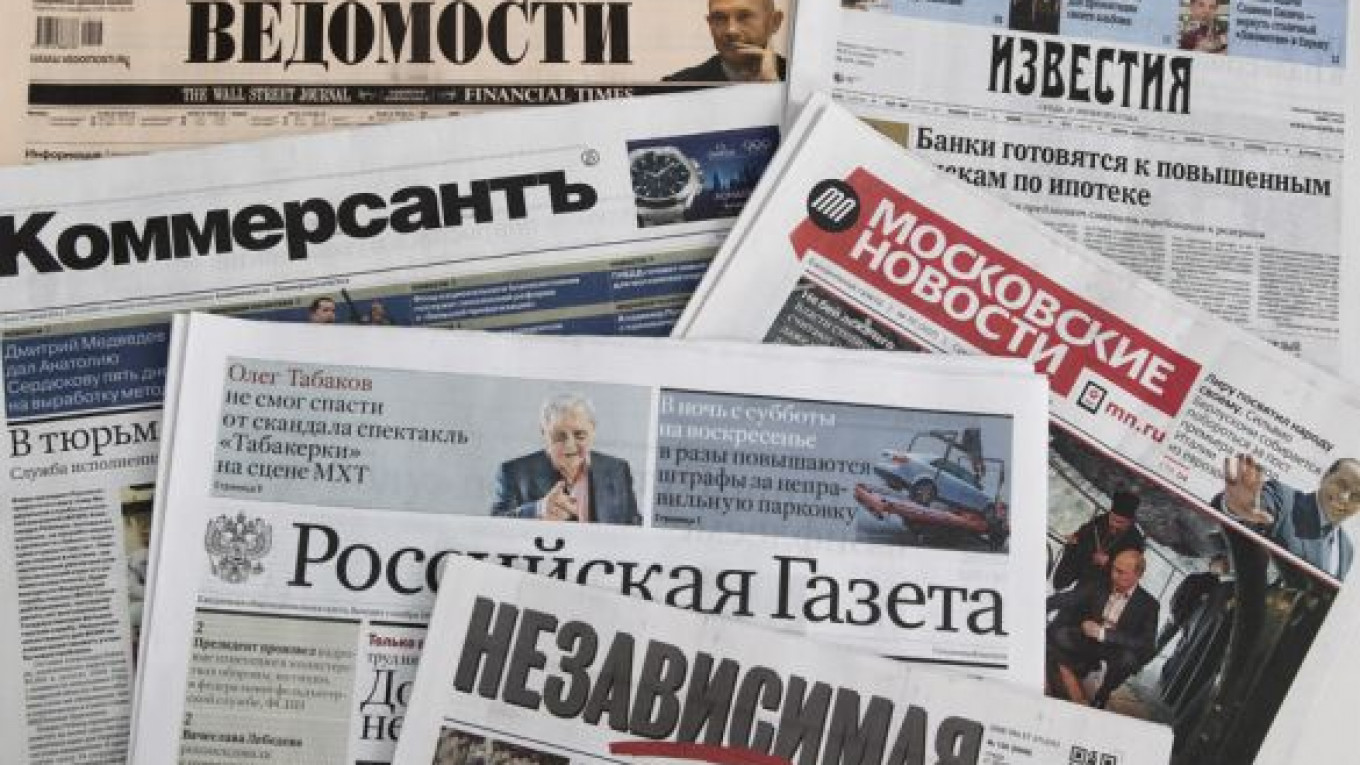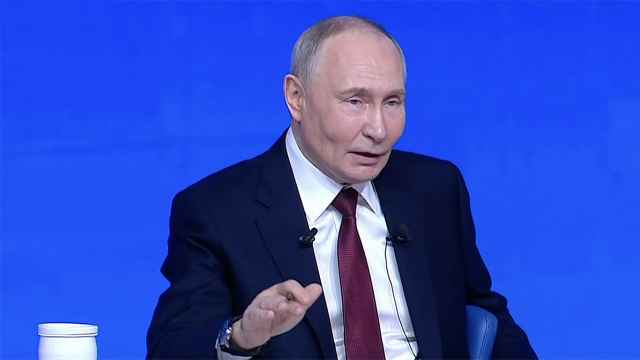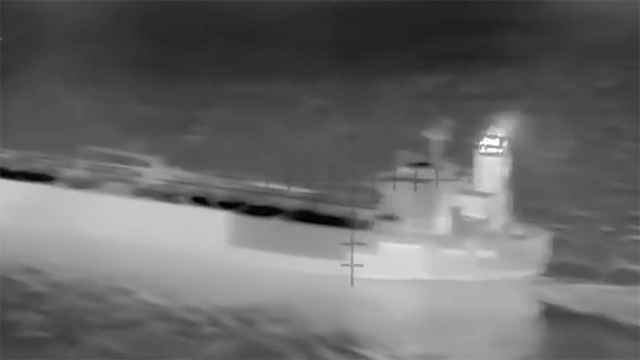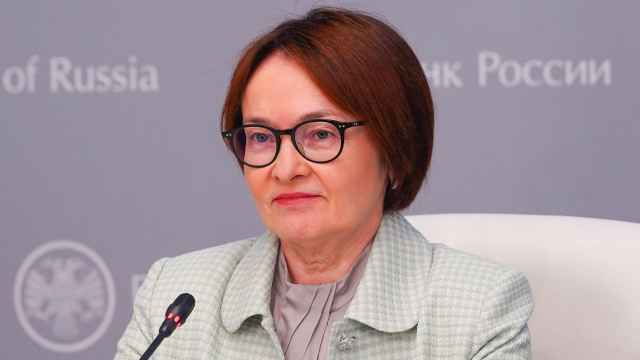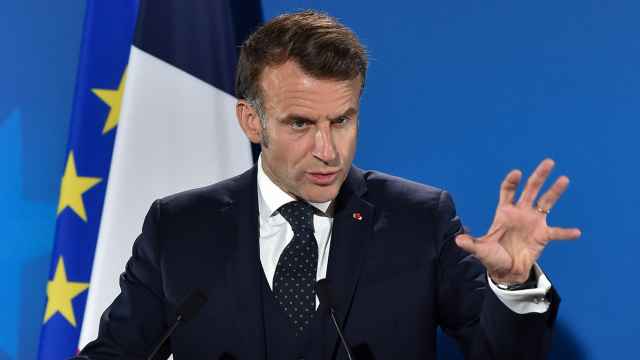Kommersant
1. Andrei Kolesnikov article headlined "Facing accomplished flag" reports on President Vladimir Putin's meeting with the Russian Olympic team in Sochi; pp 1, 3 (1,427 words).
2. Anna Solodovnikova et al. report headlined "Senator calls himself secret shareholder" says that the representative of Chuvashia in the Federation Council, businessman Leonid Lebedev, demands that TNK-BP owners pay him a share of their revenues from the sale of the company to Rosneft. Lebedev calls himself a secret shareholder of the company and has sued his former business partners; pp 1, 9 (767 words).
3. Petr Netreba et al. report headlined "Plans going to Far East" says Deputy Prime Minister Yury Trutnev has outlined plans for the development of the Russian Far East, including tax breaks and setting up of a new joint-stock company for the development of the region; pp 1, 3 (832 words).
4. Vladislav Novy and Ksenia Dementiyeva article headlined "No Soglasiye (agreement) for Svyaznoi Bank" says a deal to merge the financial assets of billionaire Mikhail Prokhorov's Onexim group with the Svyaznoi group of companies has been suspended as Onexim is not satisfied with the state of business affairs of one of the assets, Svyaznoi Bank; pp 1, 10 (478 words).
5. Irina Nagornykh article headlined "United Russia builds itself in majority constituencies" says that United Russia has decided to make the meetings of its ruling bodies more transparent and step up monitoring events in the regions; p 2 (607 words).
6. Sergei Goryashko and Maxim Ivanov article headlined "Wooden bear, flag, clock" says Alexei Kudrin's Civil Initiatives Committee has found out that the regional authorities often finance purchases of the local branches of United Russia from the local budgets; p 2 (450 words).
7. Yulia Rybina and Nikolay Sergeyev article headlined "Suicide bombers covered with hay" reports on the results of the special operation in Dagestan, in which three militants were killed. According to the law-enforcers, two of them were the organizers of the terrorist attacks in Volgograd that took place in December; p 4 (450 words).
8. Grigory Tumanov and Anna Pushkarskaya article headlined "Rights activists take third side" says that members of the presidential human rights council will take part in the hearing of the controversial law on NGOs to be held at the Constitutional Court; p 5 (472 words).
9. Sergei Strokan article headlined "People from second front" reports on the situation in the eastern parts of Ukraine where opponents and supporters of President Viktor Yanukovych are trying to influence local residents; p 6 (1,052 words).
10. Maria Yefimova interview with the new president of the PACE, Anne Brasseur, speaking on her approach to Russia and the assembly's policy towards Moscow; p 6 (580 words).
Nezavisimaya Gazeta
1. Tatyana Ivzhenko article headlined "Crimean card in big game again" says the Crimean parliament is planning to address President Vladimir Putin with a request to defend the interests of local residents as they oppose European integration plans. The address may strengthen Russia's positions at the next talks with Kiev; pp 1, 6 (1,297 words).
2. Ivan Rodin article headlined "Chaika to have income powers added" says that thanks to an initiative proposed by senator Anatoly Lyskov, the Prosecutor General's Office will be given a right to turn illegally earned income of Russian officials into state revenues; pp 1, 3 (852 words).
3. Alexandra Samarina article headlined "Zorkin does not speak out for constitution" says the Constitutional Court has supported the federal legislation allowing regional authorities to prohibit independent candidates from taking part in governor elections; pp 1, 3 (672 words).
4. Anton Khodasevich article headlined "Lukashenko allows government to do everything" says the Belarusian authorities have acknowledged industrial crisis in the country. President Alexander Lukashenko blamed the Cabinet for its failure to organize the trade of Belarusian goods; pp 1, 6 (686 words).
5. Yevgenia Novikova article headlined "U.S. acknowledges failure of Geneva 2" says the U.S. authorities are changing their strategy towards Syria, as Syrian President Bashar Assad is strengthening his positions and the opposition is turning into the army of jihadists posing threat to international security; pp 1-2 (729 words).
6. Svetlana Gavrilina article headlined "Peculiarities of St. Petersburg officials' slang" says United Russia deputy in the St. Petersburg legislative assembly has offended victims of the Leningrad blockade during World War II with her statement on a local television channel; pp 1, 5 (371 words).
7. Editorial headlined "Accident of high probability" comments on recent incidents with conscripts in the Russian Armed Forces and says that human casualties without warfare show poor control over the forces in the country; p 2 (500 words).
8. Svetlana Gamzayeva article headlined "Carte Blanche. Moscow shooter late for main lesson" outlines measures to be taken in Russian schools to prevent tragedies similar to the recent Moscow school shooting; p 3 (801 words).
9. Daria Tsilyurik article headlined "Pro-Israeli lobby loses to Obama" says the Jewish community in the U.S. has failed to affect President Barack Obama's policy on Iran. U.S.-Israeli relations are becoming strained; p 7 (756 words).
10. Vladimir Skosyrev article headlined "China and Russia build up military expenses" says NATO has started worrying about the two countries' increasing funding of their armed forces, while European countries, in opposite, are cutting budget funds; p 7 (573 words).
11. Yury Paniyev article headlined "How short-sighted Snowden knocks secret services out" says the first book of U.S. whistleblower Edward Snowden goes on sale in the U.S. and Britain this week. The secret services admit that their former employee delivered the strongest blow to the services in their history; p 7 (842 words).
Vedomosti
1. Galina Starinskaya and Dmitry Simakov article headlined "Lebedev declares himself co-owner of TNK-BP" says Federation Council member and co-owner of the Sintez company Leonid Lebedev has said that he was a secret co-owner of TNK-BP. He sued Viktor Vekselberg and Leonid Blavatnik in a U.S. court demanding from them to pay him $2 billion as his share of the money earned after the company had been sold to Rosneft; pp 1, 13 (875 words).
2. Editorial headlined "Market for patriotism" says traditional values and patriotism are becoming a marketing strategy used by some businesses to get rid of their rivals in Russia; pp 1, 6 (400 words).
3. Yelena Morozova et al. report headlined "Urals scenario in Siberia" says two candidates supported by the authorities and a member of the Communist Party are among the ones having the greatest chances of winning the Novosibirsk mayoral election. Experts do not rule out the possibility of a Communist Party victory; p 2 (500 words).
4. Another editorial headlined "Academic parade" comments on the Russian Academy of Sciences reform and notes that officials are likely to expect fast and practical results from researches; p 6 (300 words).
5. Anastasia Kornya and Svetlana Bocharova article headlined "Constitution above elections" says the Constitutional Court has ruled out that regional elections could be held without independent candidates; p 3 (500 words).
5. Igor Tsukanov and Oleg Salmanov interview with the head of the Russian Post, Dmitry Strashnov, speaking on the future of the Russian Post and current state of affairs; pp 8-9 (2,700 words).
6. Yury Nekhaychuk and Bela Lyauv article headlined "Igor Putin quits three posts" says President Vladimir Putin's cousin, Igor Putin, has resigned from three posts in the boards of directors of two banks and a construction company; p 14 (550 words).
Izvestia
1. Boris Mezhuyev article headlined "Media triumph" comments on the global media community's decision to choose President Vladimir Putin as a number one politician; pp 1, 9 (614 words).
2. Yelizaveta Mayetnaya et al. report headlined "Serezha was forced to learn prayers" tries to look at the reasons that made a Moscow teenager open fire at his school and kill his teacher and a policeman; pp 1, 4 (1,525 words).
3. Svetlana Povoraznyuk article headlined "Moscow conducts talks to buy AiF" says the Moscow city government wants to buy the Russian weekly Argumenty i Fakty from the PromSvyazKapital holding company; p 6 (556 words).
4. Yanina Sokolovskaya interview with Israeli President Shimon Peres speaking on the political crisis in Ukraine and the Israeli-Palestinian conflict; p 8 (598 words).
5. Maria Gorkovskaya article headlined "Arrival of McFaul's shift relief to be delayed" says the U.S. State Department cannot say who will replace ambassador to Russia Michael McFaul who is returning home; p 8 (549 words).
Rossiiskaya Gazeta
1. Yulia Krivoshapko interview with Igor Yurgens, chairman of the All-Russian Union of Insurance Companies, speaking on obligatory insurance of spacecraft built with state funding; pp 1, 5 (1,869 words).
2. Kira Latukhina article headlined "Putin in village, Olympic one" reports on Putin's meeting with the Russian Olympic Committee delegation in Sochi ahead of the Winter Olympics there; pp 1-2 (805 words).
3. Alexander Lenin article headlined "Breaks away" says the world media have recognized President Vladimir Putin to be number one politician; p 2 (318 words).
4. Alexander Gasyuk article headlined "Anti-Maidan comes from East" says the southeastern regions of Ukraine pin hopes on Russian support and express concern over the opposition forces taking power in Kiev; p 8 (488 words).
5. Vladislav Vorobyev article headlined "King knows better" says Saudi Arabia has threatened the Syrian opposition that it will be left without funding due to predominance of radical Islamist groups there; p 8 (449 words).
6. Anna Fedyakina article headlined "Ambassador of social networks" sums up the results of U.S. Ambassador to Russia Michael McFaul's work and notes that he has become known best for his contacts with the Russian opposition; p 8 (410 words).
Moskovsky Komsomolets
1. Yulia Kalinina article headlined "One should live where there are no Russians" comments on former Perm Territory governor Oleg Chirkunov's decision to leave Russia for France; pp 1-2 (408 words).
2. Alexei Lebedev article headlined "Two scenarios for Sochi 2014: Optimistic and realistic" says Russian athletes are expected to win from six to 10 gold medals at the Sochi Winter Olympics; pp 1, 8 (542 words).
3. Natalya Rozhkova article headlined "Maidan economy" analyses Ukraine's economic problems and polls experts who give their forecasts for economic development of the country; pp 1, 4 (3,083 words).
4. Mikhail Rostovsky article headlined "Iran being made out of Russia" says the scandal surrounding the Dozhd television channel shows that Russia is losing democratic freedom and rights; pp 1-2 (834 words).
5. Stanislav Belkovsky article headlined "Bailout plan for Yanukovych " ponders on Ukrainian President Viktor Yanukovych's future in the light of current protests that have swept Ukraine; p 3 (800 words).
RBK Daily
1. Konstantin Yamshchikov report "Another 'hello' from 1990s" says that Leonid Lebedev, member of the Federation Council from Chuvashia and co-owner of the company Sintez, has filed a suit with a New York court against businessmen Viktor Vekselberg and Leonard Blavatnik; pp 1, 8 (800 words).
2. Alexander Litoi report "Railway stations open for human rights activists" says that the Moscow Helsinki Group has checked security at Moscow's 20 railway stations and revealed that passengers are not protected; p 2 (800 words).
3. Ivan Petrov report "At speed of bullet" says that the recent shooting at a Moscow school has reminded State Duma members of a "weapons" bill. In February the parliament will debate in the second and main reading a bill toughening control over weapons bearing, article says; p 2 (600 words).
4. Alisa Shtykina et al. report "Olympic tariff" says that of all branches of industry, only telecommunication companies have chances of profit in Sochi; p 3 (900 words).
Noviye Izvestia
1. Yekaterina Dyatlovskaya report "Performing their duties in right way" says that appointments to the post of acting governor have become a routine method that helps pro-authorities candidates win elections; pp 1-2 (1,200 words).
2. Anna Alexeyeva report "Six years: What for?" looks at the trial of Bolotnaya case suspects; pp 1, 5 (1,000 words).
3. Vera Moslakova report "Criminal game room" says that yet another "prohibiting" bill has been submitted to the State Duma under the pretense of protecting children; p 2 (850 words).
4. Yulia Zabavina report "Patting hryvnya" says that the political crisis in Ukraine is becoming economic; p 3 (600 words).
Komsomolskaya Pravda
1. Yelena Krivyakina report "Transport security to cost 46 billion rubles ($1.3 billion)" says that Prime Minister Dmitry Medvedev has issued instructions to make a list of transport facilities where additional equipment to ensure security is needed; p 2 (250 words).
2. Alexander Grishin report "...And 'commissars' in dusty masks..." looks at the situation in Ukraine and says that the U.S. and the EU are "competing in making promises to and praising the new Ukrainian democracy"; p 4 (700 words).
3. Alexander Gamov interview "'Let's drink to Russian press!"" with head of the Union of Journalists of Russia Vsevolod Bogdanov; p 7 (450 words).
Trud
1. Ivan Dmitryenko report "We waited for this day as much as we could" looks at preparations for the Olympic Games in Sochi; p 20 (1,500 words).
Krasnaya Zvezda
1. Alexander Alexanderov report "'Hasty' democracy" looks at recent developments in Ukraine; pp 1, 3 (1,200 words).
2. Anna Polyakova report "Fighting among opposition" comments on the situation in Syria; p 3 (1,100 words).
Feb. 6, 2014 / BBC Monitoring / ©BBC
A Message from The Moscow Times:
Dear readers,
We are facing unprecedented challenges. Russia's Prosecutor General's Office has designated The Moscow Times as an "undesirable" organization, criminalizing our work and putting our staff at risk of prosecution. This follows our earlier unjust labeling as a "foreign agent."
These actions are direct attempts to silence independent journalism in Russia. The authorities claim our work "discredits the decisions of the Russian leadership." We see things differently: we strive to provide accurate, unbiased reporting on Russia.
We, the journalists of The Moscow Times, refuse to be silenced. But to continue our work, we need your help.
Your support, no matter how small, makes a world of difference. If you can, please support us monthly starting from just $2. It's quick to set up, and every contribution makes a significant impact.
By supporting The Moscow Times, you're defending open, independent journalism in the face of repression. Thank you for standing with us.
Remind me later.


